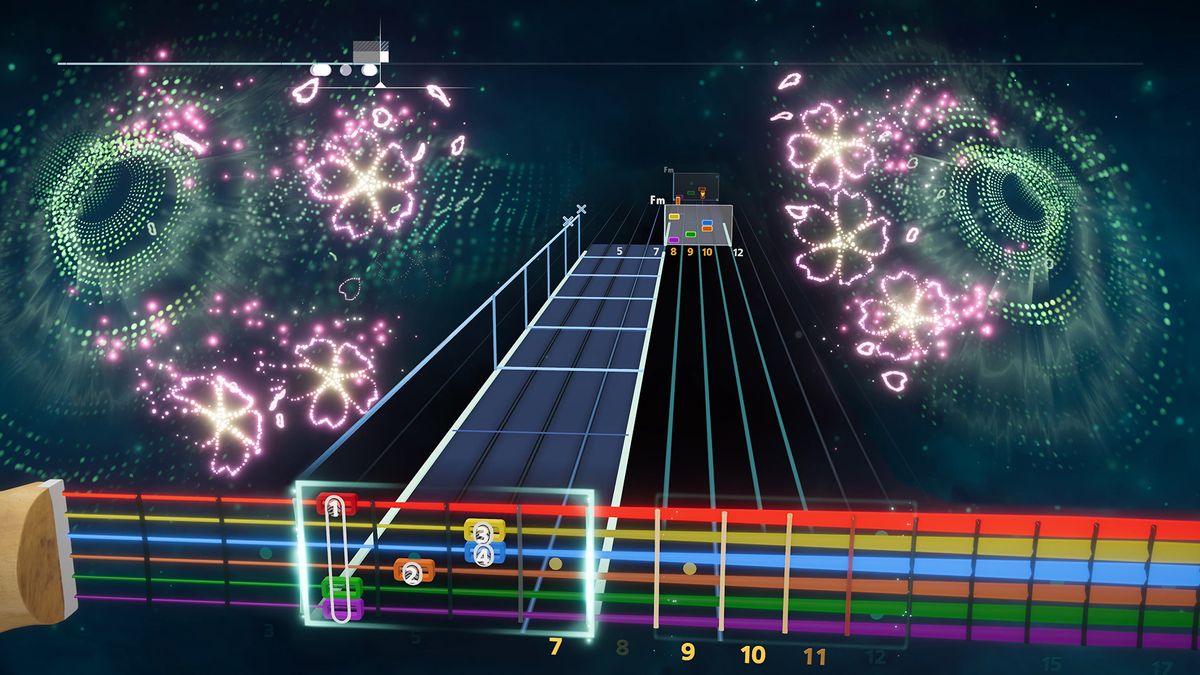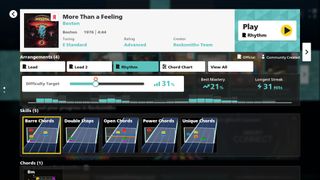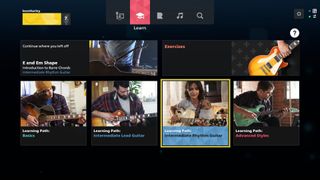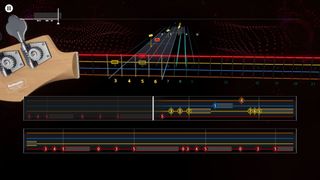Rocksmith+ is basically a Guitar Hero- style Karaoke machine that is going to make you a better player
Take it from a former music teacher: Ubi's new live service learner gets smarter as you do, and makes learning easy

Having spent a few days playing Ubisoft's new Rocksmith+, I can say it's an impressive tool for musical learning. Many years before I was a games journalist I was a musician and music teacher, so I've taught myself and others. What Rocksmith+ is doing isn't technically a world away from reading tabs and learning to play along to songs on bass or guitar, but the presentation and execution makes it a lot more fun and effective.
Perfectly tuned
For me the most impressive thing is the adaptive difficulty, which can change the challenge of what you're playing as you're playing it. Like the old Rocksmith game, songs are presented a little like Guitar Hero, with something called 'The Noteway' representing your guitar neck and the notes to aim for. Songs start on the lowest difficulty and, at that level, can simply show single notes or basic chords. As you play, if you're getting good accuracy, the system can introduce new notes – as you play and replay, the difficulty creeps up closer and closer to the original performance.
At first I felt a little frustrated to be playing one note at the beginning of each bar and listening to the rest, but it's actually a really clever system – those initial baby notes anchor you to the fretboard and song so that as things get harder you have a foundation to build on. It's surprisingly effective too. As a random example, I went from having never played the bassline to Bill Withers' 'Lovely Day' and 'Lean on Me', to being able to play both perfectly in about 20 minutes each, just by hitting 'again' each time it ended. Each time, a few more notes appear, you get a firmer grasp on the song and can build from there.

Guitar is a little more complicated, if only because there's a lot more notes generally, as well as preferences and inversions with chords. The Shins' 'The Fear', for example, uses a type of F chord I've never liked and rarely used, so nailing that precise chord was harder than if I'd just played the one I usually use. And, obviously, solos and lead things just involve learning way more… stuff. But the process is the same each time – find a difficulty level you can manage and keep practising it. Rocksmith+ seems very adept at incrementally increasing things at a pace that very slowly pulls you forward without feeling like it's asking too much.
If you do feel like you're having issues anywhere there's a bunch of tools that can help you zero in on the problems. The song's overall progress bar marks any errors you make so you can see at a glance where you're finding things harder. There's also a practice round up at the end that pulls out passages for you to loop. This uses something called the Riff Repeater that lets you replay small sections at slower speeds but the same pitch. This usually either repeats something you got wrong, or a section you might want to try with more advanced techniques.
Once more with feeling

The way Rocksmith+ breaks songs down and reacts to your playing ability feels like having a music teacher permanently on hand. Progress is always visible – whether that's through advancing the difficulty, or via a mastery score that combines the difficulty level with your accuracy. You're always going to see something going up as you gradually ramp up the challenge and your technique. Just the extra odd note here and there lead you on easily towards mastery.
I'm not totally sold on the Noteway system to show what you're playing though as, when TAB exists, it feels like a solution to a problem that isn't there. I can see what it's trying to do by representing the guitar neck as you're looking at it while playing, and it does look better on screen, but at no point does it ever feel like a better way of doing things. Chords are particularly confusing if you're used to more traditional notation. That might just be a combination of new things and old habits for me but it's telling that there's a single-press 'turn on TAB' button in the pause menu.
Sign up to the 12DOVE Newsletter
Weekly digests, tales from the communities you love, and more

Overall, Rocksmith+ is a very gamified approach to playing guitar applied in a way that makes it impressively easy to learn. As someone more used to trying to work stuff out by ear, or reading tabs and music, this feels like an incredibly accessible learning and practice tool. The new live service system, via a monthly subscription, apparently offers up over 5000 songs at launch, as well as exercises and tutorials, and 'Discover' videos that cover all the non playing stuff like culture, history, gear and so on. It's also promising new content "monthly, weekly, daily" to add more songs, interactive lessons, videos, and so on. Although even with the initial line up I previewed there's an impressive amount to keep you busy.
To the bridge
For an experienced musician or casual hobbyist player there's just a wealth of things to play along with, practice, and learn. If all you wanted is a guitar karaoke then this is great (Rocksmith+ even picks out the right amps and effects to blend you in as you play). However, for a newbie, or amateur looking to improve, this feels near essential as an almost endless reservoir of interactive learning material. That said, I would like to see some more theory content. It's all very technique based currently, which is obviously important, but it seems like there's a large music theory shaped hole here right now. It's all 'how to do stuff' and no 'why you do it', so while you'll easily learn skills there's little here for understanding them.
But then, as a live service, there's time to add that in. In its current state, having access to something this expansive for $14.99/£12.99 a month feels like a great tool for any level of guitar or bassist. It's hard not to see anyone not benefiting from some time working through its library – there's just an incredible amount of material here to learn with, and it's all done in a way that feels far more fun and accessible than less interactive videos and books.

I'm GamesRadar's Managing Editor for guides, which means I run GamesRadar's guides and tips content. I also write reviews, previews and features, largely about horror, action adventure, FPS and open world games. I previously worked on Kotaku, and the Official PlayStation Magazine and website.
Most Popular


